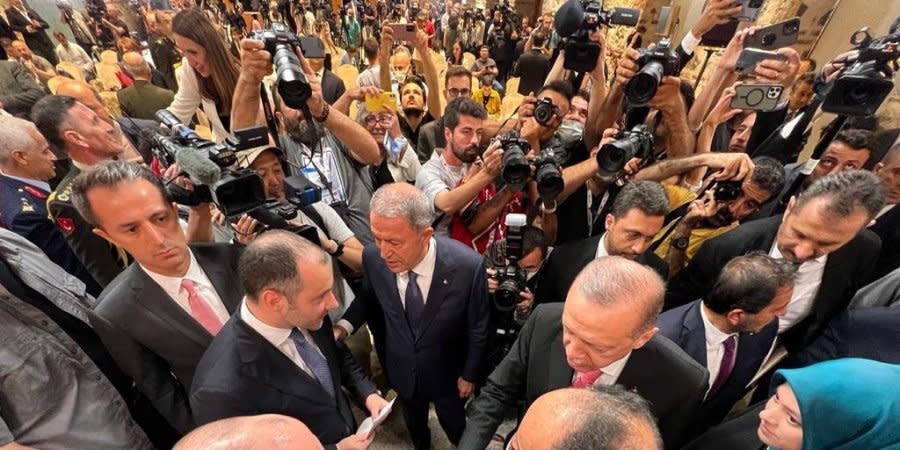Ukraine provides details of "grain agreement" struck in Istanbul

Read also: Russian invaders steal at least 400,000 tons of grain from Ukraine, says Agrarian Ministry
"It concerns unblocking the three ports of Odesa, Chornomorsk, and Pivdennyi,” Infrastructure Minister Oleksandr Kubrakov explained on Facebook.
“It is from them that we will start exporting food by sea already in the coming weeks.”
He stressed that the signing of this agreement on Ukrainian terms became possible solely thanks to the Armed Forces of Ukraine, whose successes made it possible to defend the key conditions for Ukraine, namely, to regain full control over Ukrainian territorial waters in the north-western region of the Black Sea.
A Joint Coordination Center will be established under the auspices of the UN, which will include representatives of Turkey, Ukraine, the United Nations, and Russia, who have provided guarantees regarding the safe movement of ships that will participate in the transportation of grain and food products from Ukrainian ports.
Read also: Turkey plays a delicate balancing act between Ukraine, Russia and NATO
In order to comply with the agreements, Turkey will create inspection groups from among representatives of all parties, which will ensure the inspection of cargo and personnel going to or leaving Ukrainian ports. The inspection will take place exclusively in harbors, at the entrance and exit of the Turkish Straits (the Bosphorus and Dardanelles waterways, which connect the Black and Mediterranean seas through the Marmara and Aegean seas, are usually called this collectively — NV Business). Joint inspection will protect Ukrainian ports from the entry of "Trojan horses" disguised as civilian vessels.
"I emphasize once again that activity and control in the Ukrainian ports of Odesa, Chornomorsk, and Pivdennyi will be carried out under the authority and responsibility of Ukraine," Kubrakov wrote.
“That is, control over Ukrainian ports remains entirely with the Ukrainian side. The movement of no other ships, except those that are supposed to ensure the export of grain and food products related to it, is stipulated.”
What’s in it for Ukraine?
First of all, this represents significant support for the Ukrainian economy. Kubrakov noted that more than 20 million tons of grain have locked in warehouses since last year, and a new harvest is already waiting for export. If it were not possible to break the impasse, Ukrainian farmers would question the very need to sow fields for the next year.
Read also: Russia ‘exports’ 7,000 tons of Ukrainian grain via Berdyansk, Russian media reports
"These are huge direct foreign currency earnings and a condition for the stability of our state, which will also allow us to strengthen our economy and army," the minister asserted.
What’s in it for the world?
"Operating seaports of Ukraine are our contribution to global food security and the world economy," says Kubrakov.
Read also: Putin’s Black Sea blockade leaves millions facing global famine
“According to experts, the possibility of exporting Ukrainian grain will reduce world food prices, which would slow the flywheel of inflation that has become a problem for the whole world.”
The blockade of Ukrainian seaports by the Russian navy has put at least one and a half billion people worldwide at risk of starvation, as UN Secretary General Antonio Guterres has repeatedly stated.
"This agreement gives us opportunities, but we do not stop working on the development of alternative logistics routes and are ready for any scenarios," Kubrakov added.
A mirror agreement was also signed in Istanbul by representatives of Russia.
Read also: “Grain Agreement" to extend automatically, says Turkish Defense Minister
The first quadrilateral meeting on unblocking the Black Sea export of Ukrainian grain took place on July 13, in which representatives of Ukraine, Russia, Turkey, and the UN participated.
The Turkish Defense Minister said that the delegations agreed on the establishment of a coordination center in Istanbul and aligned on "key technicalities", including "joint control at points of departure and arrival".
Russia has deliberately blocked Ukrainian ports and sea routes in the Black Sea used to export grain from Ukraine, as well as hindered exports by rail, launching missile attacks on elevators, railway infrastructure, and even grain fields, provoking widespread fires.
On July 23, following the signing of these agreements, the Russian military struck one of the ports intended to be lifted from the blockade in Odesa, causing widespread fires.
Read the original article on The New Voice of Ukraine

 Yahoo News
Yahoo News 